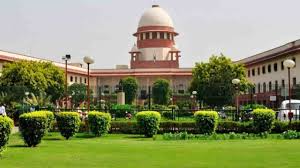TN ADGP suspension: SC transfers abduction case probe to CB-CID

Chennai, June 19, 2025 — The Supreme Court of India has transferred a high-profile abduction and custodial torture case from local police to Tamil Nadu’s Crime Branch-Criminal Investigation Department (CB-CID). The move comes after serious accusations emerged against suspended Additional Director General of Police (ADGP) Davidson Devasirvatham.
This decision reflects the court’s effort to ensure transparency and avoid bias in a case that has drawn widespread attention and raised concerns about police accountability.
How the Case Began
The issue started in March 2024 when businessman George Ponnaiah from Nagercoil alleged that police officers abducted and detained him without legal documentation. He claimed that plainclothes officers took him from his home and held him for nearly two days. During this time, he said, they assaulted him and forced him to sign confessions.
Ponnaiah’s legal team named senior officer Davidson Devasirvatham as one of the key figures behind the alleged illegal operation. The officer, however, denied involvement.
Supreme Court’s Immediate Response
Ponnaiah’s family approached the Supreme Court after local police failed to act swiftly. They argued that the existing investigation lacked independence and might protect powerful officers.
A bench led by Justices B.R. Gavai and Sandeep Mehta reviewed the plea. The judges observed that the case required a neutral agency to conduct a fair probe. Justice Gavai stated, “Justice must not only be done but must also appear to have been done.”
The court directed the CB-CID to take over and asked them to submit a status report within eight weeks.
Suspension of ADGP Devasirvatham
The Tamil Nadu government suspended Devasirvatham in May 2025 after an internal review. The review suggested that police had not followed proper procedures in the case involving Ponnaiah.
Government officials stated that they would fully support the CB-CID probe. “We are committed to a transparent and fair investigation. No officer is above the law,” said a senior Home Department official.
Relief for the Family
Ponnaiah’s family welcomed the court’s move. “We felt helpless for months. This order gives us hope,” said his brother. Civil rights groups also praised the decision, saying it showed the judiciary’s willingness to step in when law enforcement failed.
Human rights lawyer Indira Ramanathan said, “The court’s action reminds us that power should never go unchecked. Victims must feel heard and protected.”
Political Debate Intensifies
The case has sparked political reactions in Tamil Nadu. The opposition BJP and AIADMK accused the DMK government of initially shielding the officer. BJP state president K. Annamalai called the incident “a serious failure of police ethics and political neutrality.”
In response, Law Minister S. Raghupathy defended the government. He said, “We suspended the officer and respect the court’s decision. The investigation will proceed without bias.”
CB-CID’s Investigation Focus
The CB-CID will now investigate five key areas:
- Whether police followed legal procedures during Ponnaiah’s detention.
- Medical proof of torture and abuse.
- Who gave the order to abduct or interrogate him.
- Any effort to tamper with or hide key evidence.
- The role of senior officers, including Devasirvatham.
The court asked the agency to file its first update in eight weeks, adding urgency to the probe.
Why the Case Matters
This is not just another custodial case. It involves a high-ranking police officer and raises questions about how deeply power structures can suppress accountability. By shifting the probe to the CB-CID, the court showed that no officer can remain above scrutiny.
India has seen multiple custodial abuse cases in recent years. Most victims belong to marginalized or low-income groups. This case could set a new benchmark for independent investigations into police misconduct.
What Comes Next
CB-CID officials confirmed that they have already formed a special investigation team. The team will review witness accounts, medical records, and any related documents from the earlier probe.
Legal experts believe the CB-CID’s findings could lead to formal charges. “If they find enough evidence, this may move to trial,” said retired judge R. Muralidharan.
Conclusion
The Supreme Court’s decision offers a path to justice for George Ponnaiah and others who face institutional abuse. The CB-CID must now deliver a probe that lives up to public expectations. If they succeed, this case could restore some public faith in the system—and send a strong message that even top officials must answer to the law.






